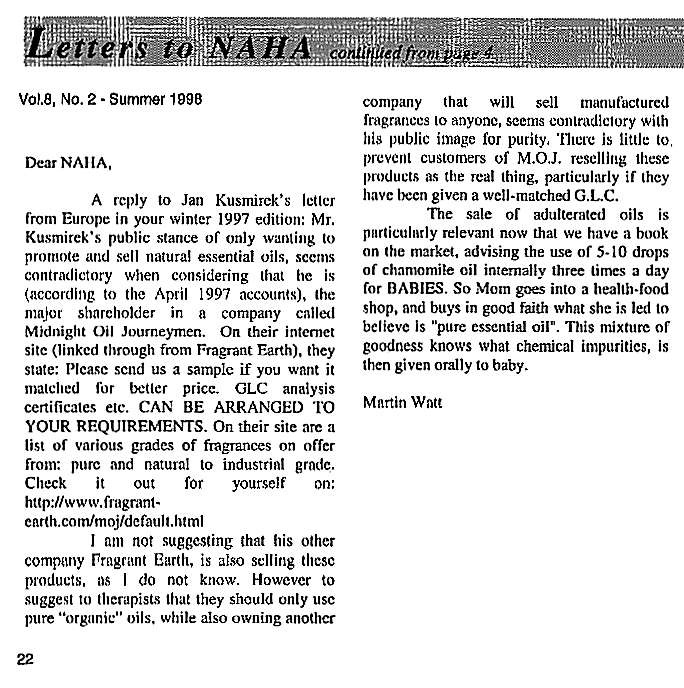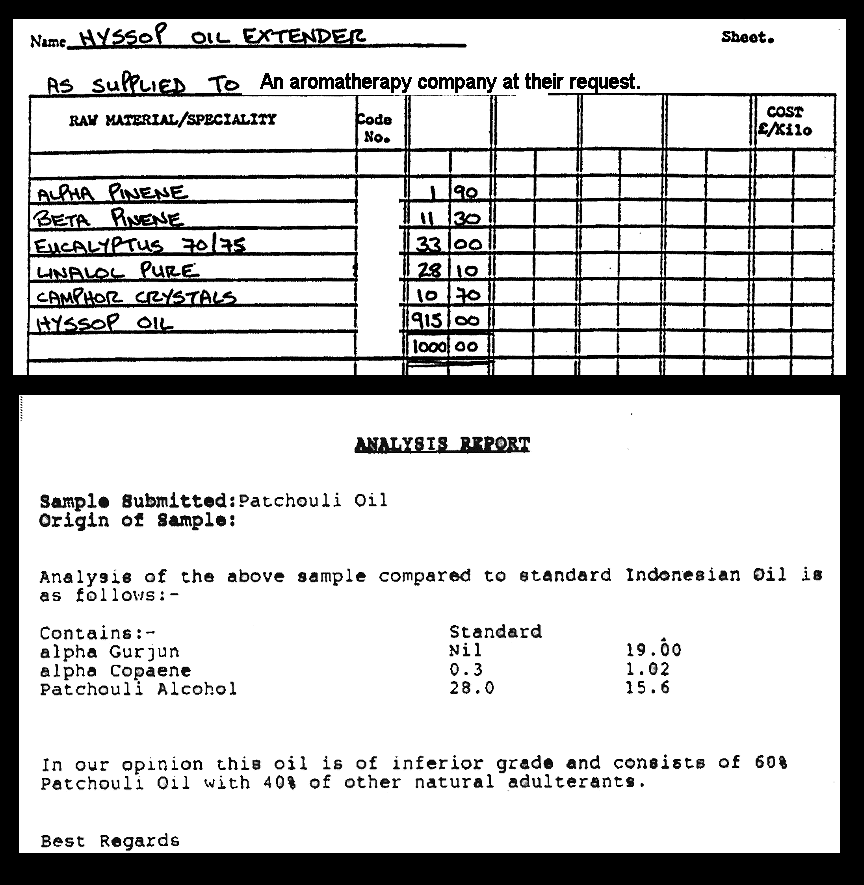The Internal use of essential oils Internal use - review of a NAHA presidents blog
Taking essential oils as medicines &the new involvement of trade organisations.
Issues on internal use.
I was staggered to see that Jade Shutes - the recent President of NAHA in the USA - was once again promoting exploring using essential oils as medicinal substances. http://theida.com/essential-oils/the-internal-use-of-essential-oils-an-exploration These issues were discussed extensively on the old newsgroups and the general conclusion was that this method had no place within a profession aromatherapy organisation. In the past NAHA prohibited their members from using this method. However, Ms Shutes who has a powerful influence on NAHA dismissed the previous safety chair Sylla Sheppard-Hanger who was partly responsible for the "no internal use" rules. Jade appointed a new safety committee from within her own circle of friends. Other Directors have left due to fundamental disagreements with Ms Shutes, yet are still listed on the NAHA website.
I am guessing Ms. Shutes wants to resurrect this idea because of the massive growth of US distributors and companies promoting internal use. Most of these on-line resources are flouting the FDA medicines regulations. North American Herb and Spice Co. had to pay 2.5 million dollars to settle a court case over medicinal claims in 2008; others are now pushing their luck over these claims. Some of these distributor's blogs give horrifyingly inaccurate information on health issues.Since writing this the FDA did act against Young Living and DoTerra and their distributors.
The article referred to above does contain many good points, but contrary views are not being posted. The article contains information that has long been misinterpreted by aromatherapists and especially their teachers. Ms. Shutes says: "I always use my own essential oil based mouth wash and drink a fair amount of herbal teas (thereby taking essential oils internally as well) including fennel and other aromatic plant teas". Without adequate analysis of this statement many will misinterpret that into meaning 'if the herb contains essential oil, that therefore this must mean using pure essential oils orally is fine'. A herbal tea contains hundreds of natural compounds not found in the oil. Also, the volume of oil in the herb can be hundreds to thousands of times lower compared to the pure essential oil. That kind of misinformation, comparing herbal use with use of the oils, is a curse in aromatherapy, and should not be used to justify consuming essential oils as medicines.
Ms. Shutes mentions the German Commission E monographs that give guidance on how much essential oil to use internally. This is nothing new as that type of use has been documented for over 100 years. However, such recommendations were based on a presumption that only genuine oils were used. These oils came as a rule via the pharmaceutical trade, whereas aromatherapy oils come largely via the fragrance trade. Those monographs have also been criticised for their lack of robust accuracy.
Adulteration & contamination: Ms. Shutes article fails to mention the issue of essential oil adulteration which is, and always has been, endemic in aromatherapy. Students are usually directed towards purchasing essential oils from their teachers or the teachers sources. Such is the case of essential oils that were obtained from suppliers who also sold constructed oils. See letter below. Even if better oils are available now, this leaves the public who read an article (by a NAHA ex President), to buy the cheapest oils, or from online distributors who posses a weak knowledge of the trade – see article archive 'Advice for independent distributors'.
UPDATE SEPT 2014. See new article on Frankincense oil over contaminants.
Coming from a background of knowing who bought what and from whom, and having witnessed expert analysis of some of these oils entering the aromatherapy market, including some from the biggest 'names' in the trade, this issue of internal use concerns me greatly. Image below.
Modified essential oils were designed for use in the fragrances and food flavouring trades where normally only tiny volumes are used making them relatively safe. They were never intended to be used as internal medicines in the manner being advocated by numerous online resources. For example; people being told to take daily doses of orange/lemon oil in water (confusion with fruit juice), or oregano oil daily with no mention that those with kidney and liver problems are putting their health in danger.
Fragrance chemicals in common with essential oils, can be purchased in a number of different grades. Chemicals used to make fragrances can contain impurities from the production process. The potential side effects of those impurities can be known from toxicity studies, or may be poorly documented.
Of critical importance always is the volume, some residues are dangerous at a few parts per million.See also the other article 'The Internal Use Of Essential Oils'.
In addition, on the wholesale market, essential oils can be purchased in a variety of grades. These oils may be perfectly genuine, but certain 'active' chemicals can be low, or the oil can be badly distilled. That is why the bulk dealers have oils analysed by experts. They do not want to be paying high prices for a low grade oil. Once those same oils enter the aromatherapy supply trade these quality distinctions are lost.
Pesticides residues: Don't be fooled by those claiming "all their oils are analysed". Routine GLC analysis for example does not detect pesticide residues (1). Pesticides have been detected in essential oils extracted from citrus peel oils and seed oils.(2). Although some of these are old references, we should never forget that illegal pesticides were dumped on under-developed countries by unscrupulous chemical companies and some remain in the food chain. Even DDT a pesticide banned years ago, and other banned pesticides, were detected in Dill and many other herbs grown in Egypt as recently as 2011. (3) If those pesticides are in the oil after distillation, only expensive and specialised analysis can tell.
If essential oils were used that only came from guaranteed organic growers in the USA the above risks are reduced. However, it is just not possible to produce all the oils advocated for internal use in one country. Organic grower certification in other parts of the world is often of doubtful validity.
The above issues have been known for years, but most suppliers try to convince the public and therapists that only their oils are 100% genuine. It is impossible for aromatherapy distributors to get all of their oils direct from growers. Therefore, some of them have to come via middlemen, some of which are notorious for adulterating the oils. You must never forget that the primary markets for large wholesalers are the fragrance trades where they will buy on price not quality.
Training: In addition to the question of quality control, we also have to examine the training of aromatherapists. I do not know of any courses that teach diagnosis to the degree that doctors get taught. If you are not certain what problem an individual has, then you are experimenting if you administer essential oils internally. If it is for self use, then you may be subjecting yourself or your family to unknown compounds with unknown actions and may be misdiagnosing what is wrong. That scenario is scary as misdiagnosis and inappropriate treatment can be fatal.
Many aromatherapy sources make a big thing about the way French doctors use essential oils internally. The fact that of the tiny number who use this method, most do it in private practice without oversight by French health authorities is ignored. Also, very few research reports have been published by these doctors in International Medical journals allowing their materials and methods to be scrutinised. There are also a few US aromatherapy schools who teach about using essential oils internally, but based on the teachings of one French doctor who refused at a conference to have his work evaluated.
Summary: I believe that for a US aromatherapy association to even consider investigating the internal use of essential oils - in view of the facts above - is not only dangerous, but could bring down tighter legislation. There is also the issue of "practising medicine without a license" which is a minefield. Laws are in place in the USA to deal with such issues, but at the moment they are not widely enforced. That does not mean they will not be.
(1). Barrek S. & Paisse O. “Analysis of pesticide residues in essential oils of citrus fruit by GC-MS & HPLC-MS after solid-phase extraction.” Analytical & Bioanalytical Chemistry 376(2), 157-161. (2) Di Muccio. et al. 1981. Nuovi ann. Ig. Microbiol. 32 (4), 267-77.
(3) 1Farag, R.S., et al. International Food Research Journal 18: 659-665 (2011)


